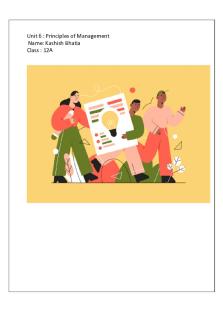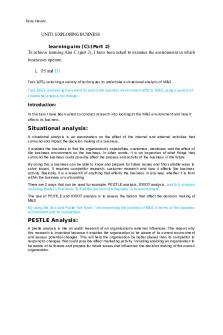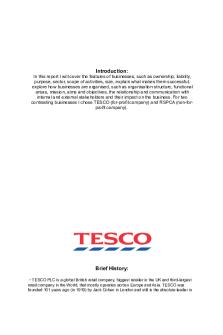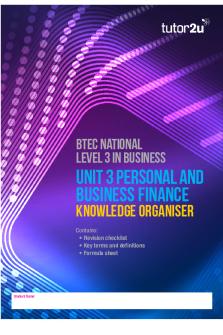Assignmen 1 business btec asda ownership and liability PDF

| Title | Assignmen 1 business btec asda ownership and liability |
|---|---|
| Author | Pablo Iglesias, Pereira |
| Course | business management |
| Institution | City of Oxford College |
| Pages | 15 |
| File Size | 266.4 KB |
| File Type | |
| Total Downloads | 66 |
| Total Views | 159 |
Summary
Organizational Structure
Asda is a tall hierarchical company, this means that the organization is structured in layers, with those at the top having more authority than those in the lower levels. With a hierarchical structure there are many strengths and weaknesses. These strengths make...
Description
P1. Explain the role and skills required to be an effective event organiser
written by
Pablo Iglesias Pereira
Explain the role and skills required to be an effective event organiser An event can be described as a public assembly for the purpose of celebration, education, marketing or reunion. Events can be classified on the basis of their size, type and context. There can be social/life events,education and career events, sports events, entertainment events, political events, corporate events etc. In order to start talking about the skills required to be an effective event organiser we need to know what an event organiser is. An event organiser is the person who is in charge of ensuring an event such as a wedding, conference or festival goes to plan and achieves all of the event objectives that were originally set. They are responsible for a checklist of items such as making sure suppliers turn up on time and that the presenter schedule is booked but they are also responsible for wider items such as ensuring that the event complies with health and safety or sustainability concerns. The following roles are the ones that are required from an event organiser:
Venue Before any other role, venue, is the first part needed to organise an event. An event organiser must have a venue where the event is going to take place. The venue is important as it sets the scene for the type of event that has been planned and it will have an important influence on whether or not the people want to attend. Setting a venue will help the event organiser to identify the costs that will be involved. For example, small venues can be offered without any cost while big venues may charge fees which need to be paid. When a good event organiser thinks about a venue they need to consider different aspects such as the type of people who will attend such as business people or students, the number of people who will be able to have seats or can stand, the most adequate travel method used to get to the location for the type of event, for example, car, minibus or public transport; and any ethical or belief consideration.
Location The location of the venue that has been previously chosen influences the success of the business event as well. A good event organiser is responsible for analysing the target market and choosing the right location. For example, if an event was planning to sell luxury products, it would need to take place in an area where the potential visitors are likely to have higher incomes and therefore, are able to afford to purchase the products. It is worth mentioning that the location may be influenced by the type of participants, for example the public or local business people. An event organiser needs to think of the best possible location in a local area for local participants. In case the event is planned with regional participation, a good event organiser needs to pick a specific location so that all the participants travel about the same distance to get there. Having knowledge of the type of people that are going to attend the event and the topic of the event also influences the suitability of the location. For example, an event that focuses on the environment should be located in a venue with easy access to people rather than a place where people can only get there by car.
Catering Catering is an important aspect when organising an event that organisers need to focus on. For example, a three-meal lunch is most likely to need a hotel with a number of facilities while a sandwich delivery may count with less strict location requirements . It is important to know that some venues offer catering and others require outside catering to be brought into the venue. Event organisers can also choose to provide the guests their own food, for example making cakes that can be given away of even sold. A good event organiser must ensure that any catering that is provided complies with the Food Standards Agency in order to avoid people getting ill
Planning and reserving facilities A good event organiser must include a plan in order for the event to success as well as making sure everything sticks to it. When planning, event organisers can’t only focus on the event itself but they must also take into account the other similar events that are happening at the same time in order to figure out how to get more people to attend; the reason is that having other events happening can result in poor attendance. The time of the year is important and influences that planning of an event. An effective event organiser is able to identify the different factors that are more likely to affect their event and they will need to think about whether
● The event should be inside or outside- it might be more suitable to run outside events on the summer ● The event is related to a festival or tradition it needs to happen at the same time. ● The event depends on different factors such as suppliers that are not available at all times of the year or are cheaper at certain month. It is worth mentioning that effective event organisers will have to plan whether physical equipment or facilities are needed to run the event. This includes buildings, IT equipment etc.
Setting up programme An effective event organiser also needs to set up the programme of the event and the way in which it will happen; It is important as it makes the event more organised. Setting up the programme and letting people know the content of the event at the different points of the event will help guide people’s interests as well as give them a summary of what will be happening during the day. The programme also needs to include details about any special guests, speeches, entertainment, prizes or any other relevant information that guests might find interesting; It is important to mention that this may encourage more people to attend the event. The programme should include the length of the event. All-day events should include extra activities on the programme such as a lunch break.
Preparing and distributing documents Many events require different types of documentation in whether hard copy or soft copy that is usually distributed before, during or after the event. Soft copies are often preferred as it is cheaper and more environmentally friendly. Event organisers often provide the documents supplied on a USB stick or in a free wallet or bag. Additionally, event organisers can upload the documents to a website or other safe online storage area with passwords given to the users so that they can be analysed. The main documents that are needed are:
● ● ● ● ● ● ●
Background Schedule of agenda Travel arrangements Event papers Accomodation Risk assessment Additional needs or special arrangements
Investigating current legal requirements, including consumer protection There are a number of important legal requirements that effective event organisers will take into account when organising an event. These include: ❏ Contractual: The Supply of Goods and Services Act 1982 is important for event organisers as they must make sure that they have a contract with any supplier they have. This involves suppliers offering intangible goods such as the venue that the venue owners supply the venue as well as other types of goods such as catering(tangible). The Supply of Goods and Services Act 1982 makes sure that the event organisers are protected from the suppliers in case there is any issue, for example, with payment. ❏ Health and safety, including public liability insurance: For all events, there will always be strict health and safety requirements and making sure that the event organisers
and the people who attend the event are aware of these is key in order to ensure everyone’s safety. The Health and Safety at Work Act 1974 focuses on the responsibility that everyone has with their own health and safety and have a duty of care with others. Effective event organisers need to contact different agencies that are qualified to ensure that all health and safety requirements are met. These include police, fire, ambulance, environmental health/ food standards agency, highways, and local authority licensing team. ❏ Age restrictions: Any well organised event needs to meet age requirements. For example, at events such as music events or festivals, it must be ensured that young people are aged 18 or over in case they want to buy any alcohol or tobacco products. On the other hand, there are also rules about selling lottery tickets to under age people. ❏ Licensing: For many events, it is required to count with a special license. The license can be for running the event itself and be required by the council, or it can also be for the purposes of entertainment. The following activities are some of the ones that don’t need a license: live unamplified music, live amplified music for up to 200 people, performances of plays and dance for up to 500 people, indoor sporting events for up to 1000 people as long as the event takes place between 8 a.m and 11 p.m. ❏ Consumer protection: In october of 2015, the Consumer Rights Act 2015 replaced other pieces of legislation such as the Sale of Goods Act and Unfair Terms in Consumer Contracts Regulations and the Supply of Goods Act. The purpose of the Consumer Rights Act 2015 is providing protection to everyone, including event organisers, consumers, and suppliers. This act brought a number of changes to the rights of consumers related to different types of services and events, including digital content such as apps, e-books and movies, additional protection for faulty goods, and additional protection for unfair terms such as hidden charges or fees. It is worth mentioning that consumers can take events into court, which is expensive and time consuming so what they can do instead is an Alternative Dispute Resolution(ADR). An ADR can be used in order to negotiate between both parties involved to avoid the time and costs of the court procedure. The following are some of the skills event organisers need: ❏ Problem solving: Problem solving skills refers to the ability to solve problems in an effective and timely way without any impediments. It involves being able to identify the problem, creating alternative solutions, analysing and selecting the best alternative, and implementing the selected solution. Obtaining feedback and responding to it appropriately is an essential aspect of problem solving skills too. Effective event organisers need this skill for a number of reasons. For example, it can make an event organiser stand out; people are usually trained to do the same things and they have different skills and knowledge in what they do. However, a lot of people cannot solve problems when they are not expecting it, and for this reason, for an event organiser, being able to solve problems can make them be easily noticed, recognized, and appreciated.
❏ Time management: Time management is the process of organising and planning how event organisers divide the time between specific activities. Good time management is important as it leads to event organisers to work smarter and not harder so that they get more done in less time, even when they got pressure and stress. Time management is key for event organisers as it brings a number of benefits to the event organisers, including greater productivity and efficiency, a better professional reputation, less stress, increased opportunities for advancement, greater opportunities for advancement and greater opportunities to achieve important life career goals. ❏ Communication: Communication skills are abilities people use when giving and receiving different kinds of information. Some examples include communicating ideas, feelings or what’s happening around them. Communication skills involve listening, speaking, observing and empathising. It is also helpful to understand the differences in how to communicate through face-to-face interactions, phone conversations and digital communications, like email and social media. Communication is important for event organisers as clear, firm, and kind communication can establish them as the leaders of the team, keeps everyone on track, and ensures that the goals of the event are clear to everyone involved and it also allows them to effectively share their vision and get others excited about it too. ❏ Negotiation: Event organisers also need to be able to negotiate. This means that they need to be able to reach agreements with others without having any type of issue with them. It is worth mentioning that negotiating involves looking for mutual benefit, being fair, and developing relationships. Event organisers must also be able to negotiate with suppliers or analysing different services and facilities available. Negotiation skills are important for event organisers as they may be able to get a better price. Event organisers need to be clear, prepared, confident when discussing terms, and good at listening to others
❏ Interpersonal: Interpersonal communication means the skills that every even organiser needs at the moment to work with others. For example when an event organiser needs to communicate with suppliers and customers. It is worth mentioning that a good event organiser will count with the following qualities: optimistic, calm, confident, relaxed, positive, and they must also demonstrate rapport with others and appropriate levels of empathy.
P2. Investigate own skills in the form of skills audit written by
Pablo Iglesias Pereira
Investigate own skills in the form of skills audit The following are some of the most common formats for skills auditing:
Likert scale The likert scale is usually involved in research that involves questionnaires. It is the most widely used approach to scaling responses in survey research, such that the term is often used interchangeably with rating scale, although there are other types of rating scales. When answering a Likert item, the people who respond must specify their level of agreement or disagreement on a symmetric agree-disagree scale for a series of statements. A scale can be created as the simple sum or average of questionnaire answers over the set of individual questions. Likert scaling assumes distances between each choice are equal. Many researchers employ a set of such items that are highly correlated.
Semantic differential scale The Semantic Differential Scale is a seven-point rating scale that can be used to derive the respondent’s attitude towards the given object or event by asking them to choose an appropriate position on a scale between two contrasting adjectives such as warm or cold or powerful or weak, etc. Semantic differential scaling is another way to make questions to an event’s attendees about the performance of the organiser; this table can include adjectives such as organised and disorganised, well managed or badly managed, excellent communicator or poor communicator, and well presented or badly presented.
Observation Observation is another common way to gain feedback. An observation is when an individual is asked to watch and analyse what an event organiser is doing to consequently judge and get their own conclusions about their performance. Observation is a good method to evaluate how someone is performing in real time. One of the observers' tasks is to write down some notes about what the event organiser is doing well as well as what they need to improve. Observation may be done without the person who is being observed knowing until after they have been observed; this is known as mystery shopping and after the organiser has been observed they are given feedback straight away.
Questionnaire Once an event has concluded, attendees are often sent questionnaires asking them to provide some feedback. This data can be collected by paper or online. Paper questionnaires are less common as they are not that practical and can be an expensive way to collect and analyse. Although online surveys have lower response rates, they are very easy to complete and they are cheap as well. The design of the questionnaires is very important and when asking questions to get feedback it is important that they are not leading, easily understood, balanced in their approach, for example yes/no, asking for the correct feedback, clear, tested before they are used at the event and aware of cultural differences that may influence responses.
Appraisals Appraisals is one way to review an event organiser’s performance after an event has finished. Appraisals about the performance allows the event organisers know what they have done well, what they need to improve, and how effectively they have used their skills. A performance appraisal can be made whether after each event, or on a regular basis such as every six months or annually. It is important to know that appraisals are a good way to review the performance as they can identify short and medium term goals that event organisers need to be aware of in order to improve their skills and performance for the future.
1 Organised
2
3
x
4
5
6
7
8 Disorganised
Well managed
x
Badly managed
Excellent communicator
x
Poor communicator
Well presented
x
Badly presented
Good with time management
x
Bad with time management
Creative
x
Not creative
Good people skills/ manner
x
Bad people skills/manner
Good problem solver
Good negotiator
x
Strongl y agree
I can communicate well verbally
Bad problem solver
x
Agre e
Have no opinion
x
x
I am passionate about events management
x
I know the factors which contribute to a successful event
Strongly disagree
x
I have good time management skills
I am good with social media
Disagre e
x
I have experience in managing events
I am polite and well mannered
Poor negotiator
x
x
For my P1 I talked about some of the skills needed by event organisers, these include problem solving, time management, negotiation, communication, and interpersonal; these skills are key for event organisers as they allow them to perform in an effective and professional way.
From my semantic differential scale, I can analyse my skills and find out what I am doing well and what I can improve, for example, Ones of the skills required is problem solving; this skill is essential as many things can come up without us expecting it, and from my semantic differential scale I notice that I am currently a 4, which means that I can still improve my problem solving skills. The second skill needed for event organisers is time management. With time management I’m currently a 2, which means that I am doing pretty well but I can still put some more effort in order for me to reach the highest level. The next skill is communication. In communication I am a 3 at the moment, which suggests that I’m not bad a it but I can and I should improve it as communication is one of the most important skills needed in order to have an excellent performance. The fourth skill is Negotiation. Once I have reviewed my semantic differential scale I can clearly see that it is my weakest skill, I am a 5, and this suggests that this is the skill that I should focus on the most as negotiation is key for event organisers in order to use the money and resources in a more efficient way. The last skill is Interpersonal. According to the semantic differential scale I am doing quite well on interpersonal skills but I would say it is not good enough, and the reason is that interpersonal skills as well as communication is one of the skills that need to be excellent.
...
Similar Free PDFs

Business Assignment 1 - asda
- 7 Pages

Btec Business Assignment 1 AB
- 12 Pages

btec business Unit 6
- 6 Pages

Chapter 7 Business Ownership
- 5 Pages

BTEC Business Unit 5 Assignment 1
- 27 Pages

10302 Chapter 1 - asda
- 42 Pages

(2) Ownership and Restrictions
- 15 Pages

Technoprintdocu - asda
- 3 Pages

BTEC Business Unit 21 assignment 2
- 19 Pages

(Part 2) P5 & D2 - btec business
- 30 Pages
Popular Institutions
- Tinajero National High School - Annex
- Politeknik Caltex Riau
- Yokohama City University
- SGT University
- University of Al-Qadisiyah
- Divine Word College of Vigan
- Techniek College Rotterdam
- Universidade de Santiago
- Universiti Teknologi MARA Cawangan Johor Kampus Pasir Gudang
- Poltekkes Kemenkes Yogyakarta
- Baguio City National High School
- Colegio san marcos
- preparatoria uno
- Centro de Bachillerato Tecnológico Industrial y de Servicios No. 107
- Dalian Maritime University
- Quang Trung Secondary School
- Colegio Tecnológico en Informática
- Corporación Regional de Educación Superior
- Grupo CEDVA
- Dar Al Uloom University
- Centro de Estudios Preuniversitarios de la Universidad Nacional de Ingeniería
- 上智大学
- Aakash International School, Nuna Majara
- San Felipe Neri Catholic School
- Kang Chiao International School - New Taipei City
- Misamis Occidental National High School
- Institución Educativa Escuela Normal Juan Ladrilleros
- Kolehiyo ng Pantukan
- Batanes State College
- Instituto Continental
- Sekolah Menengah Kejuruan Kesehatan Kaltara (Tarakan)
- Colegio de La Inmaculada Concepcion - Cebu





